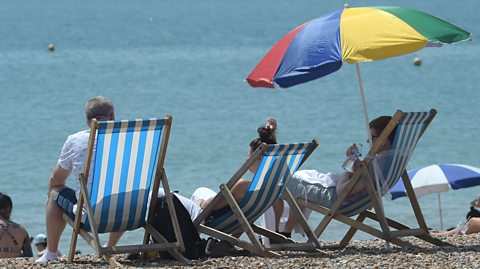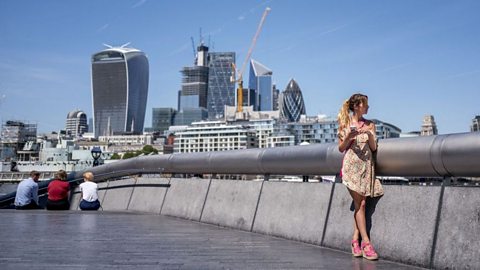This article was written in 2019.
Thursday 25 July is set to be the hottest day ever recorded in Britain, and my goodness are we feeling it.
The hottest July temperature ever recorded in the UK was 36.7C in 2015, however this week it could reach a whopping 39C.

But itās not just here: records are set to be smashed all over Europe, with the mercury predicted to rise to the low forties.
But why is it happening, and is it something we should expect to see more often?
What is a heatwave?
Letās start with the basics. A heatwave is defined by the Met Office as an uninterrupted period of exceptionally high temperatures.
Thereās a threshold temperature for it to be described as a heatwave, and it varies in different parts of the country:
- In parts of Scotland, Northern Ireland, Wales, North and South West England, the threshold is 25C.
- From Lincolnshire across to Cheshire and down to Dorset, the threshold rises to 26C.
- For parts of the Midlands, East Anglia and for much of the Home Counties, itās 27C.
- It goes up to 28C in London.

These thresholds take into account what the temperature is like on average at the hottest part of summer in each area of the UK, and then theyāre set to be quite a bit higher.
The threshold has to be reached or exceeded for three days in a row for it to be called a heatwave - if it doesnāt last three days, itās considered a hot spell.
Itās definitely a heatwave right now, so why is it happening?
Much of the UKās hot weather comes from the jet stream, which is a narrow band of high speed winds. On either side of this, there will be slower warm and cool winds.
At the moment, the jet stream is sitting to the west of the UK, meaning weāre on the warmer side of it, and itās been in the same position for about a week. The warm air thatās being brought up to us is originating in northern Africa, and this week the winds will change and bring it through Europe and up to us from France, meaning the air weāre getting is exceptionally hot.
Itās also linked to the fact that thereās an area of high pressure sat to the east of the UK, which is drawing up the warmer flow.
Will this happen more often, and should we be worried it?
A lot of people worry that heatwaves such as this one are due to climate change. We spoke to Grahame Madge, a Met Office climate spokesman, who told us that whilst the frequency of extreme events such as these likely hasnāt changed much over the years, the severity has definitely increased.
āExtreme events in themselves are nothing newā¦ whatās interesting from a climate point of view is when you look at those extremes weāre adding far more hot extremes than we are cold extremes.
āWhatās different is weāre effectively super charging the atmosphere with all this background warmth. Planetary temperatures have raised by about one degree or so since pre-industrial periods so weāre adding that spike to all of the extreme events that we have, which is getting us to a point where weāre seeing more warm extremes and less cool ones.
āThese would have always been warm events in the absence of climate change but they wouldnāt have been as extreme.ā
So should we be concerned about this?
āWeāre seeing signs of climate change happening now, we are experiencing new extremesā¦ in terms of temperature, and obviously this week we may see the all-time record temperature brokenā¦ these are worrying signals," said Mr Madge.
He added weāre also seeing extreme events in terms of extreme rainfall and, when you combine that with other indicators of climate change, such as Arctic sea ice melt, glacier melt, sea level rise, there is compelling evidence that our climate is changing rapidly.
"We recognise we are going to be committed to a certain level of climate changeā¦ [but] it should encourage every attempt humanity can make to reduce the impact of further climate change,ā warned Mr Madge.
When does summer *really* start?
Is summer solstice the start or the middle of summer? We can't rely on the weather, so we asked the experts.

Hay fever, sunburn, spots and sweat marks: Summer myth busting with Dr Alex
We asked Dr Alex George to help us debunk some summer myths.

Why do leaves fall off trees?
It happens every year, but do you know why?
